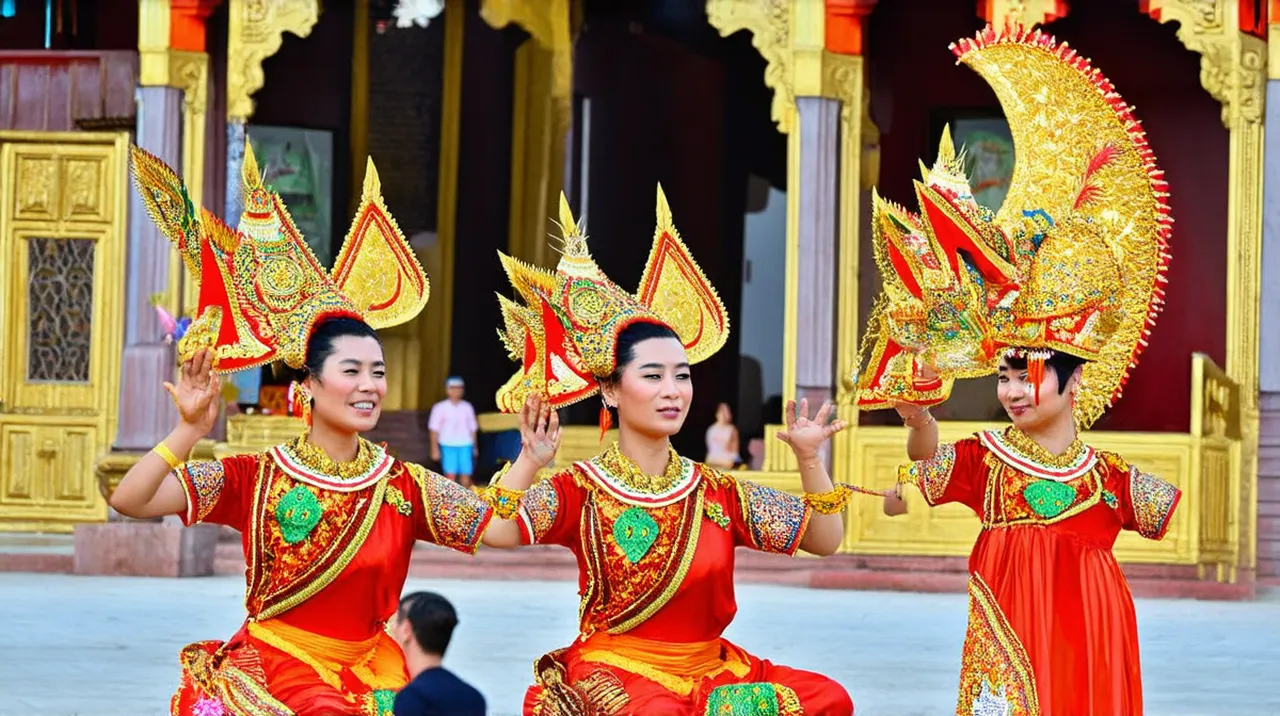
Can Tho Culture: A Deep Dive into the Heart of the Mekong
Table of Contents
Can Tho Culture
Can Tho culture is a fascinating blend of traditions, cuisine, and unique experiences that reflect the vibrant life of Vietnam’s Mekong Delta. Known for its lush landscapes and sprawling waterways, Can Tho offers travelers a glimpse into the local way of life through its floating markets, traditional music, and culinary delights. In this article, we will explore the rich cultural tapestry of Can Tho, highlighting must-visit spots, traditional practices, and engaging Activities that will enhance your understanding of this enchanting region. Join us as we delve into the heart of the Mekong and discover the authentic culture that Can Tho has to offer.
Want to find the best travel deals for this destination? best adventure planner with our adventure planning specialist!
1. Exploring the Vibrant Floating Markets of Can Tho Culture

The floating markets of Can Tho are a fascinating glimpse into the local lifestyle and cultural vibrancy of the Mekong Delta. Primarily operating in the early morning, they offer a lively atmosphere where boats brim with fresh produce and authentic goods. One of the most iconic markets is Cai Rang, renowned for its beautiful setting and bustling trade.
Visitors can experience the sights and sounds of the market while sampling local delicacies. Furthermore, this is a wonderful place to interact with the friendly local merchants. Transitioning from boat to boat, you’ll witness the timeless tradition of trading goods and stories.
“Don’t forget to indulge in a bowl of hot pho or fresh tropical fruits while exploring the floating markets!”
2. Understanding Traditional Vietnamese Music in Can Tho

Traditional Vietnamese music plays a significant role in Can Tho culture, showcasing the rich heritage and emotional expression of the locals. Various musical styles can be found, but Nhac Tai Tu stands out as a key genre in Can Tho. It is often performed at community events, reinforcing social cohesion.
As you listen to the soft melodies of the dan tranh (Vietnamese zither) or the rhythmic beats of traditional percussion instruments, you will feel a deep connection to the culture. Importantly, attending a live performance will give you insight into the stories and traditions passed down through generations. Transitioning to a deeper appreciation of this art form will create lasting memories.
3. Culinary Delights: Signature Dishes of Can Tho Culture

The culinary scene in Can Tho is a vibrant tapestry woven with local flavors, and it showcases the region’s rich heritage. Signature dishes like Can Tho grilled fish and bánh hỏi (thin rice vermicelli) are must-try items that highlight the region’s freshness and creativity. Many restaurants focus on using locally sourced ingredients, ensuring that every meal reflects the essence of Can Tho culture.
In addition, don’t miss the chance to enjoy fruit smoothies made from the freshest tropical fruits available. Transitioning to the night market scene, you’ll discover how each dish tells a story while engaging with local vendors adds to the charming experience of dining in Can Tho.
4. Festivals & Celebrations: Experiencing Local Traditions in Can Tho

Can Tho is renowned for its vibrant festivals and celebrations that reflect the rich Can Tho culture and its agricultural roots. One of the most anticipated Events is the Hung Kings’ Festival, which honors the ancient Vietnamese kings and showcases traditional music, dance, and food. As I witnessed the colorful parades and enthusiastic performances, I felt a deep connection to the local heritage.
Moreover, the Tet Trung Thu or Mid-Autumn Festival is celebrated with immense joy. Children parade with lanterns, and families gather to enjoy mooncakes and fruits. This festival truly Highlights the importance of family and community in Vietnamese culture.
In addition, local rice festivals take place throughout the year, celebrating the harvest with exciting games and traditional rituals. These Events not only showcase the agricultural life but also invite travelers to immerse themselves in authentic Can Tho culture.
5. Craftsmanship: The Art of Weaving and Pottery in Can Tho

The craftsmanship in Can Tho is a testament to its rich culture, particularly in weaving and pottery. Local artisans have honed their skills over generations, creating intricate designs that embody the essence of Can Tho culture. Visitors can witness the meticulous process of weaving traditional mats and textiles, which often adorn homes across Vietnam.
Furthermore, pottery is another cherished art form in Can Tho. The local pottery community produces beautiful ceramic wares that are both functional and decorative. Visiting workshops where artisans mold clay into stunning pieces is truly inspiring. It offers a glimpse into the dedication and passion behind these crafts.
By engaging with local artisans, travelers not only gain insight into Can Tho culture but also appreciate the time-honored techniques that are at risk of fading away. This connection fosters a deeper understanding of the region’s heritage.
6. Sacred Sites: Temples and Places of Worship in Can Tho
In Can Tho, sacred sites play a significant role in the spiritual life of the community. The Buddhist temples and pagodas are not merely places of worship but also Landmarks that reflect the unique Can Tho culture. One such temple is the Vinh Trang Pagoda, famed for its stunning architecture and serene atmosphere. Visitors often find peace while exploring its tranquil gardens and intricately designed structures.
Additionally, the Nam Ky Khoi Nghia Monument honors local heroes and serves as a reminder of the region’s historical struggles and resilience. It is a key site for both remembrance and celebration among locals.
Engaging with these sacred sites allows one to appreciate the spiritual customs and practices that define the cultural landscape of Can Tho. The inviting nature of these places encourages travelers to explore and connect with the local community, deepening their understanding of Can Tho culture.
7. Eco-Tourism: Engaging with Nature and Local Communities
Pro Tip: Book your Cancún adventures in advance through Viator for the best deals!
Eco-tourism in Can Tho presents a remarkable opportunity to connect with nature while supporting local communities. By immersing yourself in the lush landscapes of the Mekong Delta, you will encounter diverse ecosystems that provide habitat for myriad wildlife. Moreover, participating in eco-friendly tours often incorporates cultural interactions with local residents, enhancing your understanding of Can Tho culture.
For instance, many eco-tours include cycling through farms or visiting organic plantations. These experiences not only showcase the natural beauty but also contribute to sustainable practices by promoting local agricultural methods. Additionally, it’s an excellent way to sample fresh produce directly from farmers, making your trip even more memorable.
Pro Tip: Engage with local guides to gain deeper insights into eco-friendly practices and the importance of biodiversity in Can Tho.
8. Cultural Workshops: Learning Traditional Crafts in Can Tho
Cultural workshops in Can Tho offer a hands-on approach to learning about traditional Vietnamese crafts. These workshops range from pottery making to weaving, allowing visitors to experience Can Tho culture firsthand. Not only do these Activities provide a deeper appreciation for local craftsmanship, but they also allow you to create personalized souvenirs.
During a pottery workshop, you may have the chance to mold clay and design your pieces under the guidance of local artisans. Meanwhile, weaving classes often reveal the intricate techniques used by skilled weavers. These experiences are not only enjoyable but also help to preserve cultural heritage.
Tip: Be sure to ask about the cultural significance behind each craft during the workshop to enrich your understanding.
9. River Tours: A Unique Perspective on Can Tho Culture
Insider Tip: Get the most out of your Cancún visit with guided tours!
Exploring Can Tho through river tours provides a unique and immersive perspective on Can Tho culture. The winding waterways of the Mekong Delta serve as vital transportation routes, linking communities and showcasing daily life. Whether you opt for a boat tour or a traditional rowboat experience, you will witness the charm of riverine livelihoods.
During these tours, you can engage with local fishermen, visit floating markets, and experience how life revolves around the water. It’s not uncommon for travelers to participate in fishing Activities or learn about traditional fishing techniques. Such interactions enrich your appreciation of the local culture and lifestyle.
Insider Advice: Opt for early morning tours to witness the vibrant activity of floating markets at their peak.
10. Land and Water: Understanding the Agricultural Practices of Can Tho
The agricultural landscape of Can Tho is not only picturesque but also a vital part of its culture. This region is renowned for its rice paddies and fruit orchards, which thrive due to the fertile land and abundant water supply from the Mekong River. Interestingly, rice cultivation has long been a tradition here, deeply embedded in the local way of life.
Moreover, farmers in Can Tho employ traditional methods that reflect sustainability and respect for nature. For instance, many families practice intercropping, planting multiple crops in the same field to enhance soil fertility and reduce pests. This agricultural diversity not only helps sustain the farmers’ livelihoods but also enriches the local cuisine.
As you Explore Can Tho, you’ll notice how agriculture intertwines with daily routines. Local markets are filled with fresh produce, and engaging with farmers can provide insight into their techniques. Ultimately, the harmonious relationship between land and water in Can Tho is a unique facet of the region’s cultural heritage.
11. Local Legends and Folklore: Stories That Shape Can Tho Culture
Stories and legends are integral to the Can Tho culture, often passed down through generations. These tales are not just entertaining; they reflect the values, traditions, and identity of the local community. For instance, many legends are connected to the rivers, showcasing the deep respect the people have for their natural surroundings.
One popular legend tells of the “Sow the River,” where a dragon transformed into a river to provide water for crops. Such stories are recounted during family gatherings, helping to strengthen bonds and pass on cultural heritage. Furthermore, traditional festivals often feature performances that depict these legends, making them a visual and auditory experience.
By understanding the local legends, visitors can gain a deeper appreciation for the Can Tho culture. It enhances the travel experience, allowing for a connection that goes beyond mere sightseeing.
12. Night Markets: A Taste of Can Tho’s Nightlife and Local Products
The vibrant night markets of Can Tho are a feast for the senses and a crucial aspect of its culture. As the sun sets, these markets come alive with colorful stalls offering an array of local products, from fresh fruits to handcrafted goods. Moreover, the atmosphere is electric, filled with laughter, bargaining, and the aromatic scents of street food wafting through the air.
Visitors cannot miss the opportunity to sample local delicacies such as banh xeo (Vietnamese pancake) and fresh seafood. Each bite reveals the unique flavors that characterize Can Tho cuisine. Additionally, vendors often share stories about their offerings, revealing the cultural significance behind their dishes.
Notably, the night markets also serve as a social hub, where locals gather to unwind after a long day. Ultimately, exploring Can Tho’s night markets is essential for anyone seeking an authentic taste of the local lifestyle.
Can Tho culture is a rich tapestry woven from traditions, culinary experiences, and the community spirit that thrives in this vibrant city. From the colorful floating markets to the intricate craftsmanship, these cultural experiences offer a profound glimpse into the life of the Mekong Delta. As you plan your visit, remember to engage with the locals and immerse yourself in the heritage that shapes Can Tho. What aspects of Can Tho culture are you most eager to experience? Share your thoughts and join the conversation in the comments below.